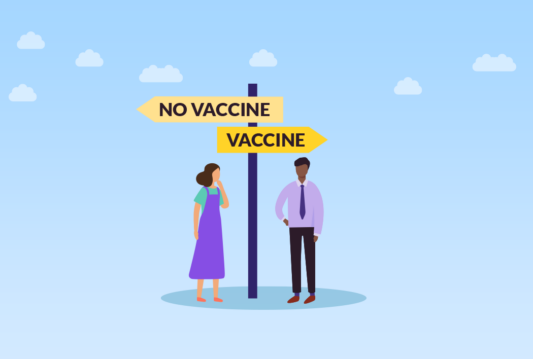Introduction
We have come a long way since the beginning of the COVID-19 pandemic. The vaccine rollout is in full force, and things are starting to return to normal. Despite its enormous success in reducing infection rates, many Canadians still haven’t been vaccinated, and some remain skeptical about its safety and effectiveness. It is essential to know that (with very few exceptions) no employer can mandate vaccination for their employees. Therefore, as an employer, you need to be prepared to handle vaccine-related disputes in the workplace.
What can cause vaccine disputes at work?
Misinformation about vaccines circulated long before the COVID-19 pandemic, and it’s bound to endure long after the crisis ends. The evidence in favour of vaccination is overwhelming. Vaccination is extraordinarily safe, safer even than many activities we consider risk-free or negligibly dangerous. Vaccination is effective, too, demonstrating incredible success at preventing or minimizing harm from infection. There has been a lot of confusion when it comes to vaccines and the workplace. Get answers to employer-related frequently asked questions on vaccines and the workplace that help provide accurate and credible information.
The small but vocal minority of people who oppose vaccination are not confined to any particular demographic or region. Most of us probably know someone in this category, and there’s a decent chance we work with one or more, even in fields one would expect to be universally in favour of vaccination, such as healthcare. People who oppose vaccination don’t even agree on their reasons for opposition, making it difficult to generalize about them or succinctly explain all their arguments.
This variability also makes it challenging to manage workplace tensions around vaccination. There is a lot of deeply personal and emotional sentiment wrapped up in some of these stances, and both pro- and anti-vaccination people have harassed people or been harassed over their position.
What does the law say?
These two points in combination can feel unsatisfying. If someone is wrong, don’t we have an obligation to correct them, especially if their being wrong relates to a critical issue of public health? If an employee faces discipline for harassing a colleague who opposes vaccination, they might feel the punishment is unjust. Handling delicate and complex matters like this requires tact, patience, and good communication skills. Moreover, employers need to keep in mind that singling out the employees who refuse to take the COVID-19 vaccine is not a good option. It can lead to more confrontations with other employees and can cause an occupational stress injury.
Everyone has a right to be free from harassment in the workplace. This is the law, and employers have considerable responsibility to prevent harassment, as well as investigating claims of harassment in the workplace. Whether in favour of vaccination or opposed to it, no one may harass another person for any reason, and certainly not for their position on vaccines, however ill-informed that position might sound.
How can you handle vaccine disputes at work?
Considering a high probability of facing a vaccine dispute at work, employers need to explore all their rights and responsibilities to avoid such situations. Even though, as an employer, you cannot make it a condition of employment for any employee to get vaccinated, there are certain policies you can have in place to help reduce the chance of disputes in your workplace.
As the vaccination rollout accelerates, we want to help prepare you for the very real possibility you’ll have to manage this situation in your workplace. That is why our HR experts have prepared a downloadable guide that outlines the best practice advice on the topic.
Download the FREE Guide to Handling Vaccine Disputes now!
While HRdownloads uses reasonable efforts to maintain this site/blog and its Services in an up-to-date fashion, it does not warrant the completeness, timeliness or accuracy of any information contained on this site/blog or any of its Services, whether in English or French, and may make changes thereto at any time in its sole discretion without notice. All information and Services provided by HRdownloads are provided to members and/or users “as is”, “with all faults,” “as available” and at the sole risk of members and/or users. Our human resources information and recommendations are based on seasoned, best practice field experience and should not be construed as legal advice.
